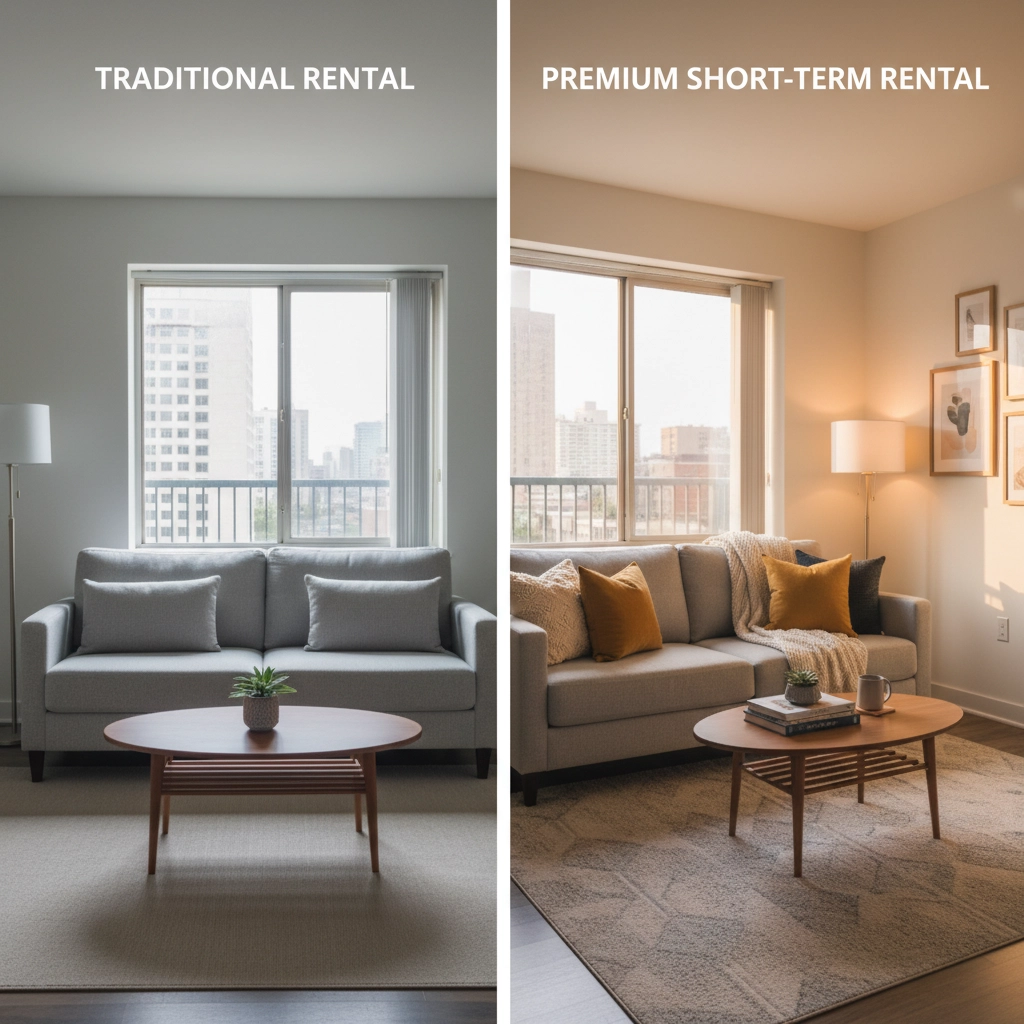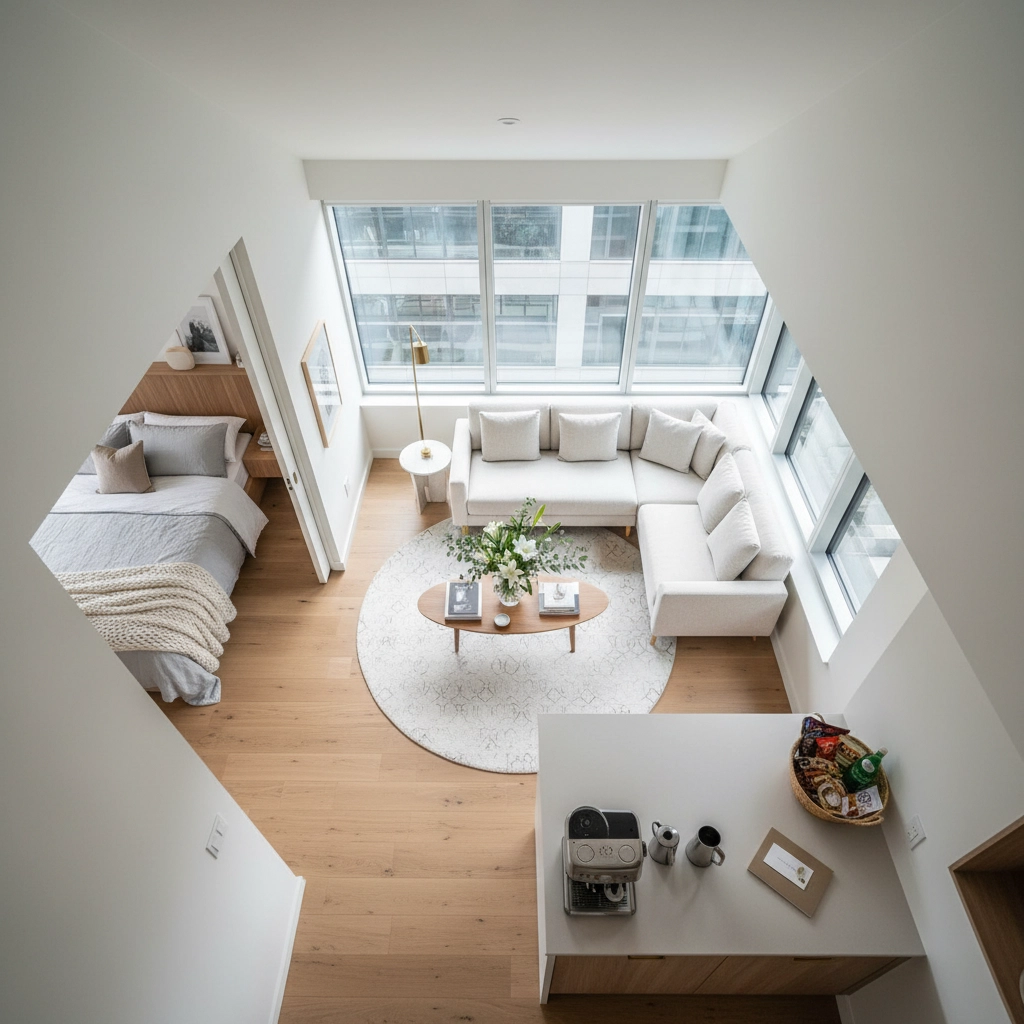
The Simple Trick to 2-3x Your Rental Income Right Now (Hint: It's Easier Than You Think)
If you're stuck watching your rental income crawl upward by 3-5% annually while your expenses seem to jump much faster, you're not alone. Traditional long-term rentals have become a slow-growth game where landlords wait years to see meaningful returns. But there's a shift happening that smart property owners are capitalising on right now: and it's delivering income increases of 200-300% almost overnight.
The trick? Converting your traditional rental property into a short-term let. And before you think "that sounds complicated," hear us out: it's far easier than most landlords imagine, especially when you have the right support system.
Why Traditional Rentals Are Leaving Money on the Table
Let's start with some real numbers. A typical two-bedroom flat in Manchester might rent for £1,200 per month through traditional letting. That same property, optimised for short-term guests, can easily generate £120-180 per night. Even at 60% occupancy (which is conservative for a well-managed Airbnb), you're looking at £2,160-3,240 monthly: that's a 180-270% increase.

The maths becomes even more compelling in popular areas. Properties in city centres, near universities, or close to business districts often see occupancy rates of 70-80% when properly managed. We've seen landlords who were earning £15,000 annually from traditional rentals suddenly bringing in £35,000-45,000 from the same property.
But here's what most landlords don't realise: the biggest barrier isn't the concept itself: it's the execution. Managing short-term rentals effectively requires a different skill set, more time, and specific knowledge about pricing, guest communication, and property optimisation. That's exactly why most landlords never make the switch, even when they know it would boost their income.
The Short-Term Rental Advantage Goes Beyond Higher Nightly Rates
While the income potential is the obvious draw, short-term rentals offer several advantages that traditional lettings simply can't match:
Flexibility and Control: With traditional tenants, you're locked into year-long agreements with minimal control over your property. Short-term rentals give you the flexibility to use your property personally, adjust pricing based on demand, and make improvements between bookings.
Reduced Wear and Tear: Guests typically stay 2-7 days, meaning less daily wear on appliances and fixtures. Plus, professional cleaning between each stay keeps your property in excellent condition.
Premium Positioning: Short-term rentals allow you to position your property as a premium experience rather than basic accommodation. Guests expect and pay for quality, which justifies higher-end furnishing and amenities that command top rates.

Market Responsiveness: Unlike fixed rental agreements, you can immediately adjust pricing for local events, seasonal demand, or market changes. Christmas markets, conferences, concerts: every local event becomes a revenue opportunity.
Why Most Landlords Don't Make the Switch (And How to Overcome These Barriers)
Despite the clear financial benefits, many landlords stick with traditional rentals because they're worried about:
Time Management: Managing bookings, coordinating cleaners, handling guest communications, and maintaining listings across multiple platforms can feel overwhelming.
Setup Complexity: Getting properties guest-ready with proper furnishing, amenities, and professional photography requires upfront investment and expertise.
Regulatory Concerns: Understanding local regulations, licensing requirements, and tax implications can seem daunting.
Guest Issues: Dealing with difficult guests, damage, or noise complaints feels riskier than having stable long-term tenants.
These concerns are valid, but they're also completely manageable with the right approach. The key is having systems and expertise in place to handle these challenges professionally.
The Complete Transition Process (Simpler Than You Think)
Converting from traditional to short-term rental doesn't require you to become an Airbnb expert overnight. Here's how the process typically works:
Property Assessment and Optimisation: The first step involves evaluating your property's short-term rental potential. This includes analysing local demand, competition, and identifying necessary improvements. Many properties need minimal changes: fresh paint, quality linens, and basic amenities often suffice.
Professional Setup: This covers everything from creating compelling listings with professional photography to setting up pricing strategies that maximise revenue. The listing description, amenities list, and house rules all impact booking rates and guest quality.

Operational Management: Day-to-day operations include managing bookings across multiple platforms, coordinating cleaning and maintenance, handling guest communications, and dealing with any issues that arise.
Performance Optimisation: Ongoing success requires monitoring occupancy rates, adjusting pricing strategies, updating listings based on guest feedback, and staying compliant with evolving regulations.
The reality is that each of these steps requires specific expertise and significant time investment. Most successful short-term rental owners either develop these skills over months of trial and error or partner with specialists who already have the systems in place.
Real Results from Real Landlords
Consider Sarah, who owned a three-bedroom house in Birmingham that was renting for £1,400 monthly. After transitioning to short-term rentals, she now averages £3,800 monthly: a 271% increase. The property consistently books 22-25 nights per month at an average of £165 per night.
Or take James, whose Leeds apartment was generating £950 monthly through traditional letting. As a short-term rental, the same property now brings in £2,400-2,800 monthly, depending on the season. During Leeds Festival and other major events, nightly rates jump to £200-250.
These aren't exceptional cases: they represent typical results when properties are properly optimised and professionally managed.
The Professional Management Advantage
The difference between successful and struggling short-term rentals often comes down to management quality. Professional Airbnb management companies bring several crucial advantages:
Established Systems: Proven processes for guest communication, cleaning coordination, maintenance scheduling, and issue resolution that have been refined over hundreds of bookings.
Market Expertise: Deep knowledge of local demand patterns, optimal pricing strategies, and competitive positioning that maximises both occupancy and rates.
Platform Relationships: Established presence across multiple booking platforms with the reviews and rankings that drive visibility and bookings.

Regulatory Compliance: Up-to-date knowledge of local regulations, licensing requirements, and tax obligations that protect landlords from costly mistakes.
Time Savings: Complete handling of day-to-day operations, allowing landlords to enjoy increased income without increased workload.
Making the Transition Work for You
The key to successfully transitioning from traditional to short-term rentals isn't just recognising the opportunity: it's having the right strategy and support system. Many landlords get excited about the income potential but underestimate the operational complexity. Others get overwhelmed by the perceived complexity and never take action.
The smart approach is finding a middle ground: partnering with specialists who can handle the complex operational aspects while you maintain ownership and enjoy the increased returns. This allows you to capture the financial benefits without the steep learning curve or ongoing time commitment.
Whether you're earning £800 monthly from a studio flat or £2,000 from a family home, the same multiplication factor applies. The question isn't whether short-term rentals can increase your income: it's whether you're ready to make the switch and how you want to manage the transition.
The opportunity is real, the demand is there, and the systems exist to make it work. The only question is whether you'll take advantage of it or watch other landlords capture the income that could be yours.
Ready to explore what your property could earn as a short-term rental? Visit our website to discover your property's income potential and learn how we make the transition seamless for landlords across the UK.
